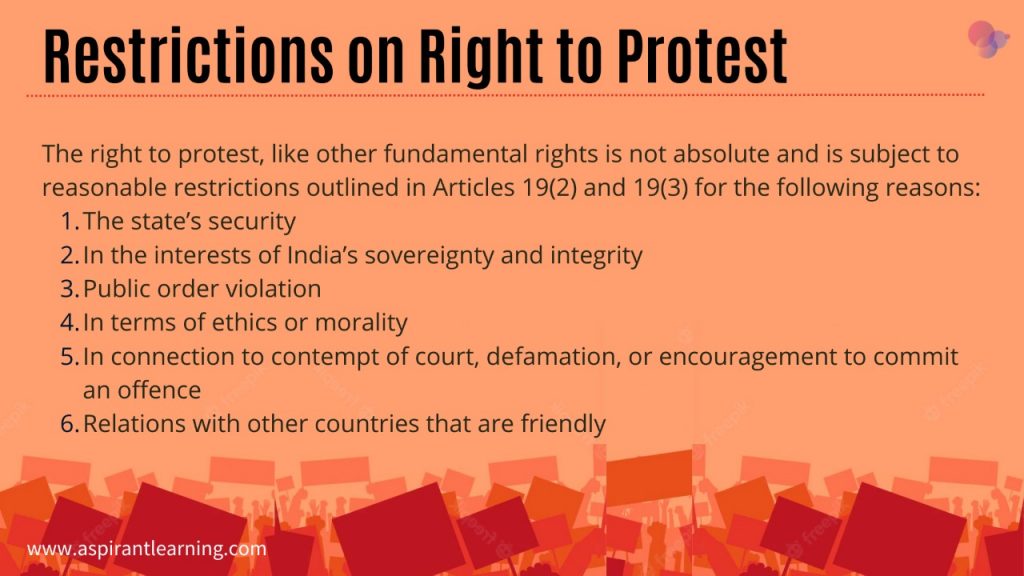News Highlight
Right to Strike: No constitutional protection for State govt. employees participating in general strike rules Kerala HC.
Key Takeaway
- Petition moved by Thiruvananthapuram natives to declare the two-day national strike held on March 28 and 29, 2022, unconstitutional.
- The Kerala High Court has reiterated that no State government employee, worker, or association has the legal right to call for a general strike or instigate the employees to strike in the guise of the fundamental right of freedom of speech and expression guaranteed by the Constitution.
Right to Strike
- About
- The word ‘strike’ comes from ‘strican to go’, which means to quit, hit or impress in case of a trade dispute.
- Furthermore, it is workers’ most influential and final resort to secure economic justice.
- This meaning of strike has undergone various changes worldwide, and most nations have given the right to strike to workers.
- It is a statutory right in India guaranteed under Section 22(1)(a) of the Industrial Disputes Act, 1957.
Constitutional provisions related to the Right to strike
- Even the fundamental freedom to form an association can be limited under Article 19(4) in the interest of public order and other considerations for the armed services and police, where discipline is the most crucial precondition.
- To secure the proper performance of their responsibilities and the maintenance of discipline among them, personnel of the armed forces or the forces responsible for maintaining public order may have their rights restricted or abrogated by legislation under Article 33 of the Constitution.
- The Industrial Disputes Act of 1947 granted the right to strike in India.
- The strike is not expressly recognised in the Constitution of India.
- The Supreme Court settled the case of Kameshwar Prasad v. The State of Bihar 1958 by stating that a strike is not a fundamental right.
- Additionally, government employees have no legal or moral right to strike.
- While the right to freedom of association is fundamental, recognising such an association is not a fundamental right.
- The Supreme Court ruled in K. Rangarajan v. Government of Tamil Nadu (2003) that employees do not have a fundamental right to strike.
- Furthermore, there is no justification for a strike on a moral or equitable basis.
- According to the court, government workers cannot extort society by going on strike.
Arguments by the government
- They have claimed that Indian Ordnance Factories are the largest and oldest industrial setup component of the Ministry of Defence’s Department of Defence Production.
- It was deemed necessary for the government to have the authority to handle the emergency these attempts caused due to the state of affairs on the country’s northern front.
- With the primary goal of self-reliance in providing the armed forces with cutting-edge battlefield equipment.
- The ordnance factories form an integrated platform for the domestic manufacture of defence hardware and equipment.
- In the public interest, the interest of the sovereignty and integrity of India, the security of any State, or the interest of decency or morality, it ensures the maintenance of critical defence services in all establishments related to defence.
Right to strike under International Convention
- The International Labor Organization’s (ILO) conventions have also recognised the right to strike.
- In addition, India is a founder member of the ILO.

Position in India
- Contrary to America, India does not explicitly acknowledge the right to strike in the law.
- For the first time, the Trade Union Act of 1926 legalised some acts of a registered commercial union in advancing a trade dispute that would otherwise violate common economic law.
- Today, the right to strike is acknowledged as a valid tool of trade unions, but only to the extent that it is permitted within the bounds set by the legislation.
- The Indian constitution does not grant an absolute right to strike but follows from the fundamental freedom to establish a union.
Conclusion
- According to Article 19(1)(a) of the Constitution, there is no fundamental right to strike.
- Additionally, no reasonable justification for strikes exists. The most common misuse of the strike as a weapon is chaos.
- The core of trade unions and groups is collective bargaining, but this is only possible if the right to strike is recognised as a fundamental right.
Pic Courtesy: Ipleaders
Content Source: The Hindu



